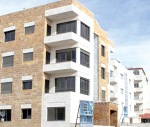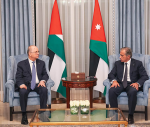Perhaps the most important challenge facing young communities during their democratic experience is accepting the results of the democratic process regardless of who the winner is, provided that parties respect the rules of power rotation.
This challenge was manifest, on a smaller scale, after the announcement of the winners of the first round of the Democratic Empowerment Programme dubbed “Demoqrati”.
The results have been met with mixed reactions by applicants in three main groups, or “windows”.
One group included winners, who counted 97 out of 618 applicants.
As expected, joy overwhelmed those who were given the opportunity to transform their ideas on voluntarism, combating violence, public awareness and dialogue into real projects.
Their excitement was even greater when His Majesty King Abdullah attended the honouring ceremony, motivating them to engage in Jordan’s public life.
Another group included applicants who did not win but exercised their right to contact the programme’s organisers and ask why they did not make it.
Believing in applicants’ right to receive feedback and improve their chances in the upcoming round in April, the programme organisers sent messages to all applicants explaining the reasons why they did not win.
The third group included applicants who failed to win but were quick to question the integrity of the programme and the jury and the soundness of the criteria applied, without giving a thought to what might have gone wrong with their applications.
In its democratic transition process, Jordan can only reach the safe political and social harbour when we draw up, with utmost transparency, standards and measures by which we determine who wins and who loses, and when losers congratulate winners and start learning how to succeed in the next round.
It is also normal to revisit criteria and standards as part of a trial and error process, for such standards remain subject to critique and change.
Jordan has a long way to go before such democratic concepts and practices are ingrained in our way of life.
We congratulate the winners, and look forward to see their pioneering ideas turn into reality and help develop schools, universities, neighbourhoods and the country as a whole.
We thank the group whose members were not lucky in the first round, for applying for the programme and insisting on their right to learn from their failure.
We promise to initiate workshops in the coming few months in all governorates to enhance their skills to prepare feasible projects.
We thank the third group for applying for the award and wish that they exhibit sportsmanship and not give up hope to succeed in the future.
The difference between winners and losers lies in the individual’s ability to learn from experience and better one’s performance accordingly.
We also hope that together we can develop a new language in dealing with each others, that one would not rush to judge and question the integrity of criteria and people without checking, and that one will continue to seek development, and not destruction.
Building such a culture is not easy, in light of a trend of mistrust in the community, but we have no alterative as individuals, institutions, society and state but to build bridges of trust and work to ensure the stability and progress of the country.
We salute all those who participate in Demoqrati and will work to perfect its mechanism which, in spite of being arrived at after consultations with a large number of civil society activists, is not sacred and is subject to modification in light of experiences gained through actual implementation of the programme.
However, we should all reach consensus on the most important democratic principle: When we all agree on the selection criteria, we should accept the results.
If that is not followed, every competitive process will turn into a bitter dispute and failure on the part of the losers to accept the outcome. I am sure that this is not the model any participant seeks.
Since we all want to empower youth, we should work together to set the conditions of the contest and accept the results on the one hand, and make sure that more rounds are organised to give all the chance to win, on the other. This is in essence what democratic transformation is all about.
The writer is the chairperson of the King Abdullah II Fund for Development. He contributed this article to The Jordan Times.













